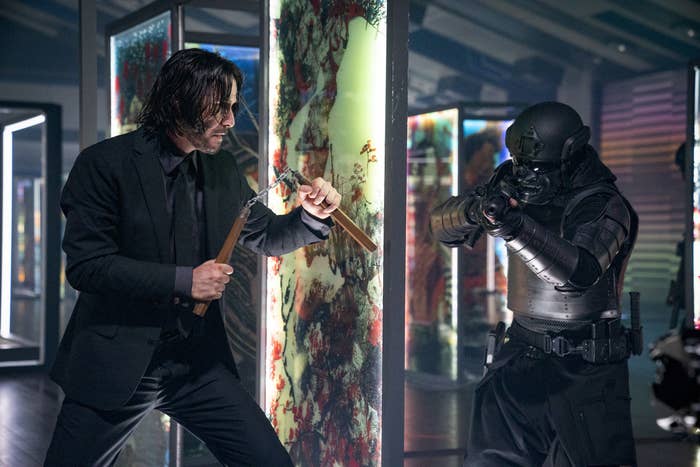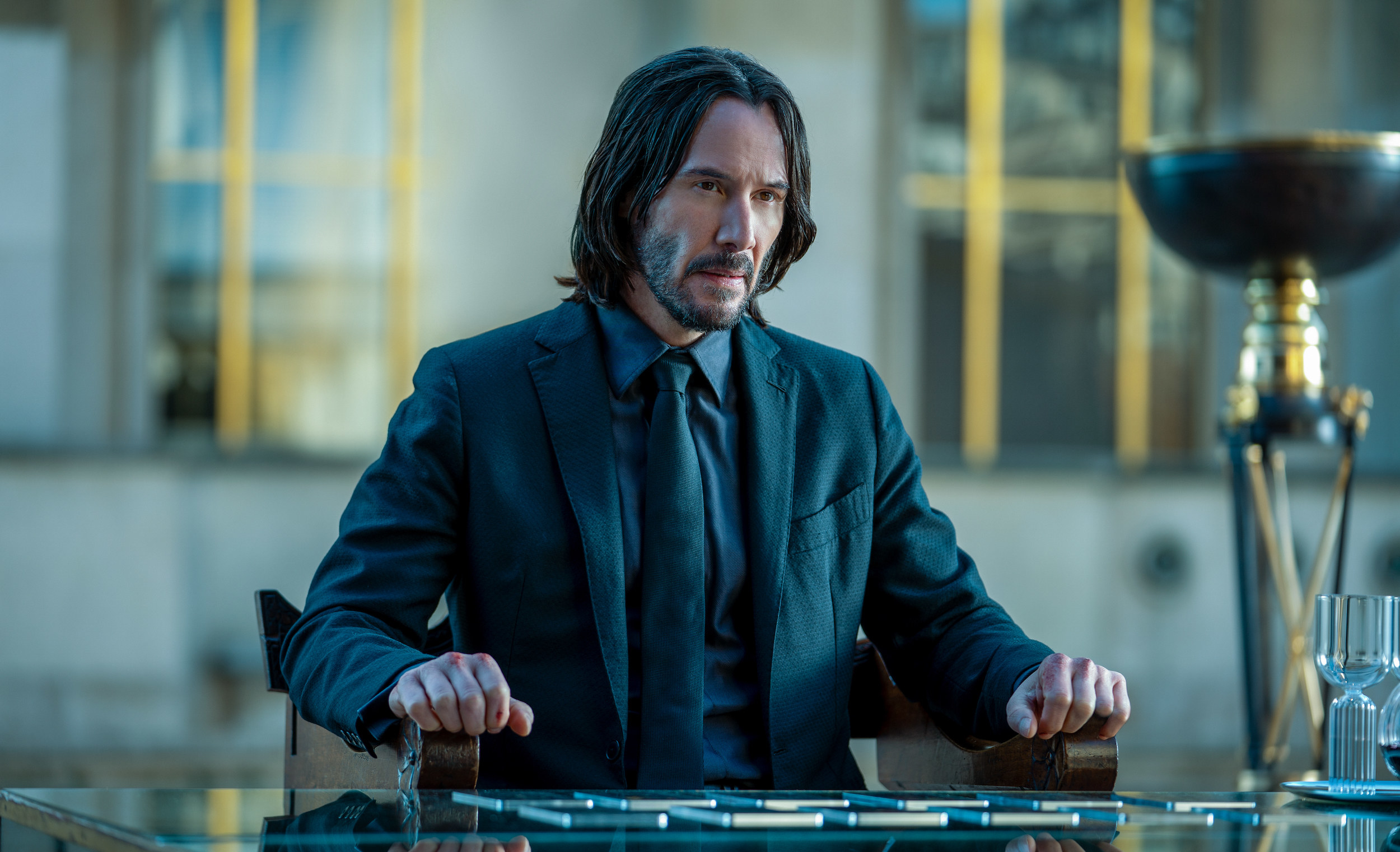
Fans of the John Wick franchise have waited eagerly for four years (1,404 days — I counted) for the release of the latest installment, John Wick: Chapter 4, which opens on Friday. If you are one of those people, let me tell you — this movie will scratch every itch and make you lie back in ecstasy. It will unleash your urge to scream with rage, wince in dread, and bellow with hysteria as John Wick (played by Keanu Reeves), a formidable assassin with massive bounties on his head, gracefully massacres the pitiful, hopeless thugs who get in the way of his vengeance and his freedom. Your molecules will separate; you will transcend your human form and evolve into a beam of pure truth and light.
As the theater darkened at an advance screening of the film in New York City, a man exclaimed, “Time to watch a bunch of dudes get shot!” Women screamed, “Keanu forever!” The atmosphere was thick with aggression and lust, and in any other situation, I’d have wanted to open a window to let out the steam, but not there.
When the franchise’s first installment, John Wick, was released in 2014, it was a standout, even in an industry stacked with studios’ heaviest action and superhero hitters. By then, Disney was 10 films deep into the Marvel Cinematic Universe and 20th Century Fox was on its seventh X-Men film. Guardians of the Galaxy and Captain America: The Winter Soldier were respectively the No. 1 and No. 3 films in the domestic box office that year. The superhero plotlines dominating theaters had melted into overstuffed sequels that, for all their fun, were becoming convoluted. Filmmakers sacrificed the freedom to express violent and sexual themes to maintain palatable PG and PG-13 ratings and maximize potential audiences.
John Wick offered adult audiences a stylishly dark and visceral experience that had been lacking, trading innocuous CGI battles for high-intensity, bloody, full-body combat. The plotlines are simple but the action is relentless, and director and stunt person Chad Stahelski injects a refreshing physicality into the films, with Reeves performing many of his own stunts. The first film kicks off with the horrendous murder of Wick’s new puppy, a final gift from his recently deceased wife. It sends the world-famous assassin, in his suffering, on a rampage, with nothing left to lose. The settings in all four films are deliciously modern and gilded, the mood replete with irresistible masculinity. The John Wick movies portray a world of power and money, and its denizens handle hard emotions in tragically unhealthy ways. For all of his prowess, Wick still suffers brutal injuries — and his vulnerability imbues him with humanity. Today, the entertainment landscape is still saturated with impressive stunts, layered backstories, and capital-P Protagonists, yet John Wick: Chapter 4 can still leave you white-knuckled, heart racing, and screaming internally.
In the opening of Chapter 4, Wick has recovered from being shot and having fallen off the roof of the Continental Hotel in the final act of the third film — and man, is he pissed. He takes off from New York to Paris, Osaka, and Berlin to fight the heads of organized crime who make up the assassins’ ruling organization, the High Table, and continually raise the multimillion-dollar bounty on his head. Wick wants vengeance for the wrongs he has suffered at their hands, and freedom from this life of death and servitude. Without giving anything away, I will say that Hong Kong action star Donnie Yen is in this film, and he is a treat. Bill Skarsgård, who played Pennywise in It, appears as the Marquis, an emissary of the High Table tasked with finding and killing Wick who devilishly masks fear and ineptitude with wealth. Lance Reddick, who died this month at the age of 60, reprises his winsome role as the Continental’s ever-cordial, ever-dedicated concierge Charon.
The franchise’s epic, impeccably choreographed gun fu, over-the-top car fights, immaculately tailored suits, and gorgeous, lavish locations make for three hours of almost arousingly polished violence. The sleek confidence of the film is underscored by callbacks that will delight fans, including allusions to iconic sequences from the last three movies — a fight in a dance club, a pair of assassins coolly firing at each other as they walk in tandem, attack dogs — but Chapter 4 is plenty more extra than all of them: The fights are longer, the body counts are higher, the opponents are even more powerful, and I am so here for it.
The reviews rolling in have been extremely favorable. If you ask me whether you should see Chapter 4, I’d howl in affirmation. As a diehard, I would have said yes before it even came out — that's the kind of devotion the franchise has inspired in fans since it began nine years ago. Hearing the words "Baba Yaga" makes our pupils dilate, our mouths water, and our hairs stand on end.

Beneath all the violence, the most gripping element of the franchise is arguably Wick’s deep abyss of pain. The role of a grieving widower whose only tools for processing agony are his unmatched skills as an assassin rather than, say, therapy is the perfect vehicle for Reeves, who so naturally conveys sadness, warmth, and gravitas with little dialogue. John Wick reignited Reeves’s career nine years ago, cementing his status as a beloved action great; his last big movie was 2008’s The Day the Earth Stood Still, which received mixed reviews. In Chapter 4, tender flashbacks remind us that Wick sees himself, above all else, as a loving husband.
The movies are also as much about loyalty and friendship as they are about vengeance. As Reeves said in an interview, audiences like Wick because the characters in his circle like him. Ian McShane and Laurence Fishburne return as Wick’s dutiful allies Winston and the Bowery King. Driven by a deep but impractical affection for Wick, they continue to devote themselves to his protection and his success, risking their own demise by defying the High Table’s ban on helping Wick. In a universe bound by stiff formalities, where the only stakes are life or death, these are ultimately acts of caring between silent men; Wick addresses these allies with laconic, repressed salutations that are nevertheless full of feeling, blanketed in a dense fog of adrenaline.
Wick rebels against the High Table’s system, which exploits the people doing the actual dirty work and operates only in its own interest. He and his fellow detractors seek a normal life and security for those they love, yet over and over, they realize their only choice is service to the High Table’s rules. There is no retirement, and the lack of choice breaks people — as one character puts it, what transpires is a warning of the cost of tyranny. The fantasy of John Wick is that, as corrupt as the system may be, just one person hellbent on overturning it can be more terrifying.
While The Continental, a prequel miniseries, will come out on Peacock this year, and a spinoff film, Ballerina, is in the works, Stahelski suggested that this will be the last John Wick film, at least for now. “Keanu and I are done for the moment,” he told the Hollywood Reporter. Reeves is 58 years old. Seeing him commit so thoroughly to this demanding role one last time is wildly moving. Saying goodbye to Wick is bittersweet, but at least the send-off left me sated. If this is it, I have served; and if Wick ever returns, I will be of service. ●
